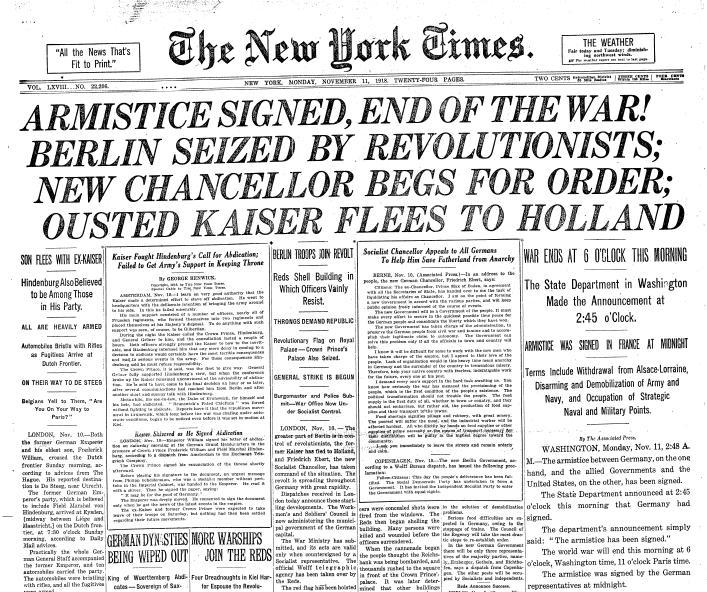Compiègne, France —(Map)
Today marks 100 years since the end of World War I. One hundred years ago may seem impossibly far in the past, but it is still important to remember the lessons of that war today.
Before World War II and the other wars that came after it, World War I was often called “The Great War” or “The War to End All Wars”. At the time, no one could imagine that there could ever be another war or a worse war.

(Source: WikimediaCommons.org.)
World War I is a lesson about how one small event can cause many other events which are bigger and worse. The killing of one leader in 1914 led quickly to a war that grew and grew. By the time World War I ended over four years later, 135 countries had joined.
World War I came at an especially deadly time. Recent inventions like tanks, airplanes, and submarines allowed humans to kill each other in much greater numbers than in the past. New chemical weapons had horrible and deadly effects, shocking people on all sides of the war.

(Source: via Wikimedia Commons.)
Close to 10 million soldiers died fighting the war. Almost 8 million other people who were not soldiers were also killed. The numbers of people injured were even higher. The war was especially hard on countries in Europe, where most of the war was fought.

(Source: Munford, from Wikimedia Commons.)
On November 11, 1918, an armistice – an agreement to end the fighting – was signed. People celebrated around the world. It was as if everyone could finally breathe a big sigh of relief.

(Source: via Wikimedia Commons.)
Many countries made Armistice Day a holiday, to remember the people who died, and to celebrate how a world at war came together to find peace.
Over time, some of these holidays have changed. In 1954, the US changed its Armistice Day to Veterans Day. Veterans Day celebrates all that soldiers, sailors, and others in the US military have done. Veterans Day is related to Armistice Day, but it does not celebrate peace.

(Source: National Archives at College Park, via Wikimedia Commons.)
Now, 100 years after the armistice was signed, people in countries around the world are celebrating. Over 65 world leaders are in France this week for special events marking the 100 years that have passed since the end of a war that people thought would be the worst in history.
German Chancellor Angela Merkel (left) and French President Emmanuel Macron at a special event remembering the end of World War I. Germany and France were on opposite sides during the war. BBC World News posted this picture.
Armistice Day: Macron and Merkel mark end of World War One https://t.co/fa7lDSG8Io
— BBC News (World) (@BBCWorld) November 10, 2018
World War I was not the worst war in history. It didn’t stop other wars from happening. It didn’t stop humans from inventing and using bigger and worse weapons. And it hasn’t stopped small events from turning into bigger events.
In today’s world, many governments seem focused only on their own country. Many do not seem interested in problems faced by people in other countries or the problems we share as a world. It’s a good time to remember the people who gave their lives to make the world a better, safer place. And it’s not a bad idea to look back and think carefully about what we might learn from history.
😕
This map has not been loaded because of your cookie choices. To view the content, you can accept 'Non-necessary' cookies.
